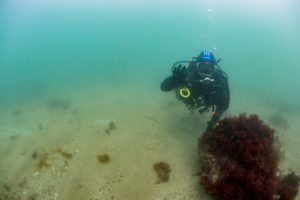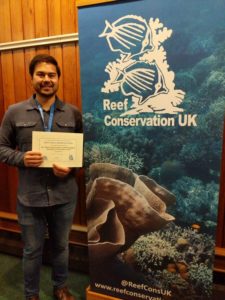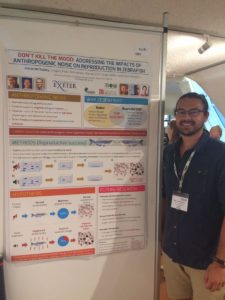Our world-leading marine research underpins a wide range of undergraduate and postgraduate programmes: Research-led teaching | Exeter Marine | University of Exeter. In our Graduate in Focus series we look at the achievements of our MSc graduates who have excelled in conservation around the world since studying with us.
Today we meet Kieran McCloskey, MSc Conservation and Biodiversity graduate (2017) and now a PhD student at the University of Exeter studying impacts of anthropogenic noise on fish reproduction and populations.

Hi Kieran! We’re glad you’ve continued your studies with us at the University of Exeter, what do you think makes the University a great place to study?
I chose this university because the programme on offer was a good fit for my interests/needs to transition into ecology from the biomedical field. The MSc in Conservation and Biodiversity offered a broad range of taught courses, field experience and an opportunity to conduct independent research through a project towards the end of the programme. As someone who needed to experience as much as possible to fully immerse myself in ecology and conservation, this programme turned out to be a perfect fit.
The Centre for Ecology and Conservation has a great balance of professionalism and approachability. While studying at the CEC, I felt that I was receiving high-calibre instruction and was participating in cutting-edge research. At the same time, lecturers, academics and visiting professionals were made available in a way that I always felt comfortable to start a discussion about ideas, interests or potential opportunities for research or job-placement.

We’re glad you have enjoyed your time with us. How have you found studying at both our Cornwall, Penryn Campus and Exeter, Streatham Campus?
Personally, as a new international student from the US, I felt that the Penryn Campus was a warm and friendly environment for someone so far away from home. I’m currently based at the larger Streatham Campus, and I am glad I was able to experience the satellite campus before moving to Devon.
Cornwall is a wonderful place to live and study. While the program itself was a good fit for me and my interests, the most enjoyable aspect of studying at the Penryn campus would have to be the scenery and surrounding areas. There are plenty of beautiful beaches and coastal walks that offer stunning views, especially at sunset. Cornwall itself is filled with community spirit and pride and has a rich history and culture. During my master’s program, I lived in Falmouth, which is a charming fishing town 30 minutes away from campus that has great restaurants, shops and pubs. Having lived in the UK now for over three years, Cornwall is still my favourite destination to visit.

What skills did you learn that helped you to develop further in your career?
There has been a lot of carry over in terms of the skills that I developed during my master’s programme that have helped me to be successful in my current role as a PhD student. My course helped me to build confidence in oral presentation and academic writing, gain proficiency in making and presenting academic posters, develop a strong foundation in statistics and data analysis, improve my background research skills and literature reviews, and make strides towards becoming an independent researcher.
The research skills course that was offered during my program was particularly helpful for someone like me who had recently switched into a research role from a previous profession. This course helped me to hone important skills, such as oral presentation, making an academic poster, completing a literature review, building my CV, and participating in public outreach. Similarly, the Career Zone offered advice and guidance on improving CVs and preparing for job/PhD interviews that I utilised. Lastly, my academic tutor and the head of my programme were terrific resources for seeking guidance about furthering my career in the academic world.

Finally, why did you choose you career in research and do you have any advice for anyone looking to pursue a similar career?
I have always been passionate about science. I previously worked in the medical field, but found that it wasn’t the right fit for me as a career. I decided to change paths and started as a volunteer on a conservation project. From there, I went on to pursue a postgraduate degree at the University of Exeter, and it was during my MSc that I was able to build confidence and come to the realisation that ecology and conservation could be my chosen profession. For me, the drive to improve our relationship with the natural world is what I enjoy most about my work. It is a cause I can support fully and have no reservations about. Furthermore, I feel that ecology and conservation are becoming increasingly important topics in science. As a society, we are starting to understand the tremendous negative impact that we have on our planet and the importance of a healthy environment. With climate change now moving to the forefront of public concern and political debate, strong foundations in ecology and conservation will be mandatory for all human activity across the globe.
As with most sectors, learn as much as you can about the industry you’re interested in. Take opportunities to explore your interests and speak with experts about their experiences. Also, it’s best to be patient. No one becomes an expert/professional in their field overnight.
Thank you Kieran!
You can follow Kieran on Twitter, @kieranp_mcc
If you want to find out more about any of our suite of #ExeterMarine Masters and Undergraduate courses use the links below!
- NEW: MSc in Marine Environmental Management
- NEW: MSc in Marine Vertebrate Ecology and Conservation
- MSc in Conservation and Biodiversity
- MSc in Conservation Science and Policy
- MSc in Evolutionary and Behavioural Ecology
- MSc in Sustainable Development
- MSc in Environment and Human Health
- MSc in Renewable Energy Engineering
- BSc Marine Biology
- BSc Zoology
- BSc Environmental Science
- BSc Conservation Biology and Ecology
- BSc Evolutionary Biology
- BSc Animal Behaviour
- BEng Renewable Energy Engineering
